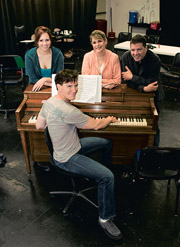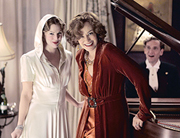Withering Heights
The opulence and decline of ‘Grey Gardens’ comes to Stages Repertory Theatre. PLUS Tea for Two: A closer look at HBO’s ‘Grey Gardens.’
by Donalevan Maines • Photo by Mark Hiebert

You know you’re gay when you’re glued to the new Grey Gardens movie on HBO. You know you’re really gay when you’re still bitter that Broadway’s version of Grey Gardens didn’t win best musical at the 2007 Tony Awards. (Why, it’s the most disgusting, atrocious thing ever to happen in America!)
Ah, but you can choose to be happy that the musical Grey Gardens opens on May 15 at Stages Repertory Theatre in Houston. As Gould, the show’s gay pianist, says, “Brava! I’m weeping already.”
The story of “Little Edie” and her mother, “Big Edie” Bouvier Beale, “cuts to the core” of what it means to grow up different, explains Kenn McLaughlin, producing artistic director at Stages. “It’s a gay rite of passage because she taps into sensibilities of ‘I will walk my own path, and walk it proudly, and without judgment.’ She has such a need to belong, but she doesn’t want to have to change to become a part of the repressive East Hampton culture [that rejects her].”
“And the costumes!” says McLaughlin. “They are absolutely, positively, completely elevated drag! They are so gorgeous you’re going to be absolutely amazed!”
A highlight of any performance of Grey Gardens is Little Edie’s song, “The Revolutionary Costume for Today,” which Broadway star Christine Ebersole sang on the 2007 Tony Awards broadcast before accepting the award for best actress in a musical.
“It’s just such a gay anthem! It’s just the best,” McLaughlin says, explaining that it encapsulates in song so much of what Little Edie says in the opening of the 1975 documentary Grey Gardens that has become a cult classic in the gay community. As depicted in the film, Grey Gardens was a crumbling mansion, and garbage-ridden home of the reclusive, nouveau-poor aunt and cousin of former First Lady Jacqueline Bouvier Kennedy (aka Jackie O). From the point of view of the 52 cats that lived there, Grey Gardens was a 28-room litter box with 150 windowsills tailor-made for catnaps. To neighbors, it was an eyesore and health hazard.
Three talented gay men—composer Scott Frankel, lyricist Michael Korie, and playwright Doug Wright (who hails from Dallas)—adapted the film into a Broadway musical by showing the Beale’s pre-Camelot salad days in act one, when they played host to the likes of Howard Hughes and the Rockefellers, then revealing in act two how the mighty had fallen.
McLaughlin compares the first act to the golden-age musicals of the 1940s. “It’s seemingly buoyant,” he says, “but there is a layer of illusion, a paradox, an irony, a subtext that is all the more powerful because we know where it’s going.
“The second act shows the ruin of their lives, and makes you wonder if that first chunk of life was a fantasy,” McLaughlin adds. “It’s like before you ‘come out,’ you create illusions about yourself, how you want the world to see you.”
“Beyond the great gay themes of the show,” he adds, “the play is about dreams, reaching for what you want, and never ever stopping. It’s a remarkable testament to the power of identity, and that’s what people really connect to. That’s what makes it a wonderful piece of art.”
Grey Gardens plays May 13–June 14 at Stages Repertory Theatre, 3201 Allen Parkway. For tickets ($35 and $40) and/or information, call 713/527-0123.
Donalevan Maines also writes about playwright Michael Wilson, a former Houstonian, in this issue of OutSmart magazine.
PHOTO CAPTION
Live gardens: director Kenn McLaughlin (far right) in rehearsal for Stages Repertory Theatre’s production of Grey Gardens with cast members (l–r) Rachel Logue (young Edie Beale), Jonathan McVay (George Gould Strong), and Nancy Johnson (Edith Bouvier Beale).
SAMPLINGS
The opening lines of Grey Gardens are spoken as if being read aloud from a newspaper:
In a statement released today, Jacqueline Kennedy Onassis confirmed that her 80-year-old aunt, Mrs. Edith Bouvier Beale, and her adult daughter, Edie, are living in squalid conditions in an East Hampton estate known as Grey Gardens. The house that once played host to Howard Hughes and the Rockefellers is now a refuge for 52 stray cats, a few rabid raccoons, and its two reclusive inhabitants, all living in an environment the Health Department calls unfit for human habitation. Mrs. Onassis described the situation as “a private family matter.”
Little Edie, from “The Revolutionary Costume for Today”:
Just listen to this! The Hamptons Bee. July, 1972. • “The elderly, bed-ridden aunt of former First Lady Jacqueline Kennedy, Mrs. Edith Bouvier Beale . . .” • My very own mother, can you imagine? • “. . . and her adult daughter, Miss Edie Beale, a former debutante once known as Body Beautiful Beale . . .” • They called me Body Beautiful Beale. It’s true. That was my, whaddyacallit, my, uh, sobriquet. • “. . . are living on Long Island in a garbage-ridden, filthy, 28-room house with 52 cats, fleas, cobwebs, and virtually no plumbing. After vociferous complaints from neighbors, the Board of Health took legal action against the reclusive pair.” • Why, it’s the most disgusting, atrocious thing ever to happen in America!
Tea for Two
A closer look at HBO’s ‘Grey Gardens’
by Lawrence Ferber
Apron strings thicker than steel cable bound the mother-daughter pair of “Big Edie” and “Little Edie” Bouvier Beale together. The eccentric relatives of Jackie O and subjects of Grey Gardens, a 1975 documentary bearing the name of their decrepit East Hampton, New York mansion, come again to life in HBO’s incredible biopic of the same title (having debuted in April, with repeat airings this month).

Directed by Michael Sucsy, Grey Gardens stars Jessica Lange and Drew Barrymore as the senior and junior Beales. Framed by recreations of Albert and David Maysles’ shooting their famed documentary, the story plays out in flashbacks — the pair’s youthful 1930s well-to-do society days, Little Edie’s brushes with her dreams of fame and romance in Manhattan, Big Edie’s failed relationships with her husband and a gay best friend (Gould, played by out actor Malcolm Gets), and their spiral into mutual codependency and squalor in a cat- and raccoon-infested mansion.
Grey Gardens received a first 21st-century revival in 2006’s Broadway musical, which snagged three Tony awards. That same year, The Beales of Grey Gardens, a “sequel” to the original documentary composed of unused footage, was released (both films are available in a fabulous, extras-loaded DVD set from Criterion Collection).
Sucsy’s Toronto-shot Grey Gardens recreates some of the documentary’s most oft-imitated and quoted highlights, including the bedridden Big Edie’s demented warble of “Tea for Two” and Little Edie’s chaotic flag dance. Yet Sucsy, and co-screenwriter Patricia Rozema, manage a tightrope act balancing drama and poignancy over the sprawling net of camp.
“The first draft that I ever wrote of the screenplay was actually too straight,” Sucsy shares, “in the sense that I had to go back in and add some of the eccentricities and the wackiness and the kooky behavior. I mean I certainly see those [campy] aspects of it, but the foundation, the skeleton of the story is more based in impaired sanity narrative thrust as opposed to the kookiness. It’s fundamentally a drama with many moments of levity. But I would be so bummed out if people didn’t laugh at this. There is tons of humor in it for me.”
Literally immersed in character — thanks to makeup designer Bill Corso’s old-age prosthetics, birdseed fatsuits, and false teeth, which took between four and six hours to apply — Barrymore and Lange frequently cracked up while shooting scenes. “There was one day when Drew laughed and her fake teeth popped out,” Sucsy recalls, amused. “And one of the cats wouldn’t put his ass down and kept sticking it in Jessica’s face. I think Jessica said, ‘Geez, guys, it’s hard enough.’”
Despite these jovial moments, and the fun of wearing costume designer Catherine Marie Thomas’ takes on Little Edie’s arsenal of homemade outfits and head wraps, Barrymore (who lobbied intensely for the part) was deadly serious in her approach. Thanks to the Beales’ relatives and friends (Big Edie died in 1977, Little Edie in 2002), she had access to troves of Little Edie’s journals, letters, and photographs, and worked intensely for a year on nailing her voice, mannerisms, dancing, and even her walk. Barrymore ultimately remained in character and avoided contact with anyone but Lange and Sucsy throughout production. “I had to be only her,” she adds. “The discipline of what I did to be as authentic as I possibly could was definitely something that made me, like, mentally unstable. It is definitely only the best work I could possibly have done. And only positivity came from that strict box I put myself in to play her.”
Barrymore also worked hard on embodying the many, and often conflicting, aspects of Little Edie’s personality. “I always believed that Edie is a walking contradiction,” she shares. “She’s a recluse, but she’s a born entertainer. She bitched and moaned about ‘getting out of this house’ every day of her life, yet the door wasn’t locked. She lived for her mother’s love and approval, but would take the underhanded comments, frustrations, and all that came with her. She wanted nothing but love, but rejected it at the same time. Everything about her really contradicted itself.”
As if echoing Little Edie, the film itself embraces and exhibits a dichotomy, eliciting laughter at the same time as empathy (keep watching after the credits for a poignant coda, followed quickly by a hysterical interruption). This crying through laughter quality is possibly one reason Grey Gardens — from the documentary to the HBO film — resonates with gay audiences. But Sucsy has a hard time articulating what exactly is so enduring. The trainwreck aspect? Flying your freak flag despite what others think? The twisted mother-daughter dynamic, a la Mommie Dearest and Now, Voyager? Perhaps the answer is ultimately as complex, and confounding, as the Beales themselves.
“I mean, [you can] see them as a tragedy, camp, or something,” he says. “I think that’s that part of what is enduring. I try to give the gay community a little more credit than maybe we identify with people who struggle with [yet] remain true to who they are at their core, even if they’re fighting upstream. Is part of the appeal rubber-necking at the tragedy? Certainly. But I don’t think that that’s the only thing that endures, because that plays to the mean, spiteful side of the gay community. And now I’m talking out of both sides of my mouth, but yes, there is a side of us [where] we can laugh at ourselves and those sort of things, and celebrate something that would normally be relegated to the back of the closet, so to speak. That’s a strength, I think, in the community. Does that make sense?”
Grey Gardens airs on HBO throughout May.
Lawrence Ferber, who is based in New York, is a regular contributor to OutSmart magazine.











Comments